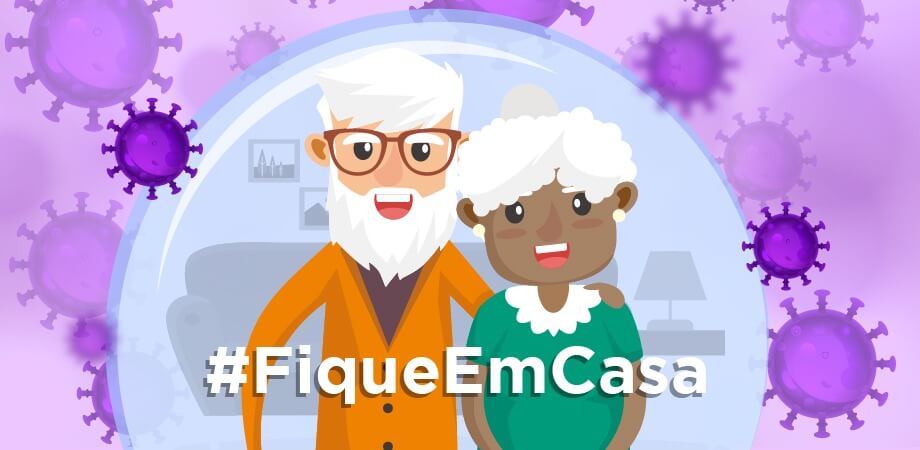Art: Maurício Oliveira Júnior
More than 28 million Brazilians are over the age of 60. This represents about 13% of the population of Brazil. In Rio Grande do Norte, the percentage is very close, reaching 12.4%, according to data from the Brazilian Institute of Geography and Statistics (IBGE). At the same time, due to the coronavirus pandemic, this population represents 52% of hospitalizations in the health system and 80% of registered deaths.
Several actions are being put into practice to alert and try to mitigate the effects of the pandemic for this population. Directed to health agents, an orientation booklet was prepared (access HERE), by researchers from the Federal University of Rio Grande do Norte (UFRN), with simple guidelines that can, and should, be followed by everyone. Among the guidelines is respect for social isolation, as well as avoiding contacts between the elderly and children.
But this care must also be taken at home, by caregivers and family members. For epidemiologist doctor Ion Andrade, who is one of the authors of the booklet, it is essential that the elderly are preserved. “Care at home is a crucial point for the management of the pandemic by public health”, he warns, highlighting the fact that the elderly are the ones who most check in. “Taking care of the elderly, we are also reducing the stress of the health system”.
The full interview of Dr. Ion Andrade can be heard below:
Use Up / Down Arrow keys to increase or decrease volume.
The epidemiologist makes a comparison with the mortality of the elderly, currently, with the infant mortality faced by Brazil, more than 30 years ago, with public policies for the protection of children. “If these deaths were concentrated in childhood, many measures would already be in progress and society’s adherence would be greater. There is a cultural naturalization regarding the death of the elderly and this cannot happen. With greater care for the elderly, we will have a reduction in contagion, due to social isolation and the unfavorable outcomes of the pandemic, which are deaths and hospitalizations ”.
The alerts given by the doctor Ion Andrade, are reinforced by the actions developed at the Instituto Envelhecer, at UFRN. According to the director of the Institute, Kenio Costa, in addition to the points of general care for washing hands and wearing masks, we have other important ones, such as creating the solidarity network beyond the home of the elderly, neighbors, informal contacts so important for that the elderly person feels they have support. An example of this is shopping at the supermarket, or going to the pharmacy, always ensuring the hygiene of purchases before passing on to the elderly.
MPRN recommends special care for the elderly during the pandemic
Given this situation, the Public Ministry of Rio Grande do Norte (MP / RN) published a recommendation to reinforce the care of the elderly with or without coverage under the Family Health Strategy. The recommendation was issued by the 42nd and 62nd Prosecutors of Justice of Natal with the measures to be taken by the municipality.
Based on a provocation carried out by the physician and researcher at UFRN, Ion Andrade, the Public Prosecutor’s Office, working together with the Public Prosecutor’s Office, considered it pertinent to demand from the Government the development of strategies that guarantee differentiated assistance to the elderly, considered the main one. COVID-19 risk group.
“This different look is more necessary every day, since primary care services have been substantially affected, due to the large number of retired professionals and the adoption of new work processes, without any perspective until the moment of a effective treatment for the disease ”, argues the Prosecutor of Justice, Raquel Ataíde.
The prosecutor also points out that the booklet prepared by the researchers at UFRN proves to be an awareness tool and facilitator of the implementation of differentiated care, consistent with the guidelines contained in the recommendation sent to the Municipal Health Department.
The document issued by the MP / RN also specifies the measures for the elderly with and without coverage under the Family Health Strategy (ESF) and for those who are institutionalized in philanthropic and private entities. All recommendations can be found HERE.
Podcasts provide tips on coronavirus care
Thinking about bringing quality information to the population in audio format, professors Esdras Marchezan, from the State University of Rio Grande do Norte (UERN), and Lilian Muneiro, from UFRN, developed the project “Todos Contra Coronavirus”. The action is a joint production of students from the Journalism and Advertising and Propaganda courses at UERN and UFRN, through HiperLAB and LAIS, in partnership with the Brazilian Association of Community Radios and the Scientific Committee of the Northeast Consortium.
The material is available through the HiperLAB channel on Spotify (available HERE). The distribution of all content is free.
Check out the first seven episodes of the project below:
TODOS CONTRA O CORONAVÍRUS [SPOT 01] Como higienizar as máscaras de tecido?
TODOS CONTRA O CORONAVÍRUS [SPOT 02] Juntos nessa luta contra a Covid-19
TODOS CONTRA O CORONAVÍRUS [SPOT 03] Por que usar máscaras?
TODOS CONTRA O CORONAVÍRUS [SPOT 04] Por que não podemos relaxar com as medidas de higiene?
TODOS CONTRA O CORONAVÍRUS [SPOT 05] A importância do distanciamento social em momento de pandemia.
TODOS CONTRA O CORONAVÍRUS [SPOT 06] Como podemos contribuir no combate ao Covid-19?
TODOS CONTRA O CORONAVÍRUS [SPOT 07] Sempre unidos no combate a Covid-19
TODOS CONTRA O CORONAVÍRUS [SPOT 08] Idoso – Afeto e Proteção
TODOS CONTRA O CORONAVÍRUS [SPOT 09] Idoso – Atenção e Proteção
TODOS CONTRA O CORONAVÍRUS [SPOT 10] Idoso – Orientação e Higiene
TODOS CONTRA O CORONAVÍRUS [SPOT 11] Idoso – Local Apropriado
TODOS CONTRA O CORONAVÍRUS [SPOT 12] Idoso – Refeição
TODOS CONTRA O CORONAVÍRUS [SPOT 13] Idoso – Valorização e suas Vivências
TODOS CONTRA O CORONAVÍRUS [SPOT 14] Idoso – Isolamento social não é prisão





